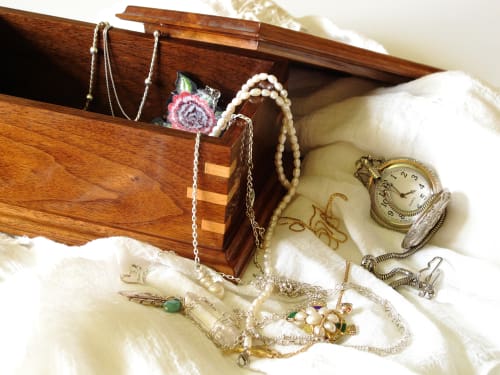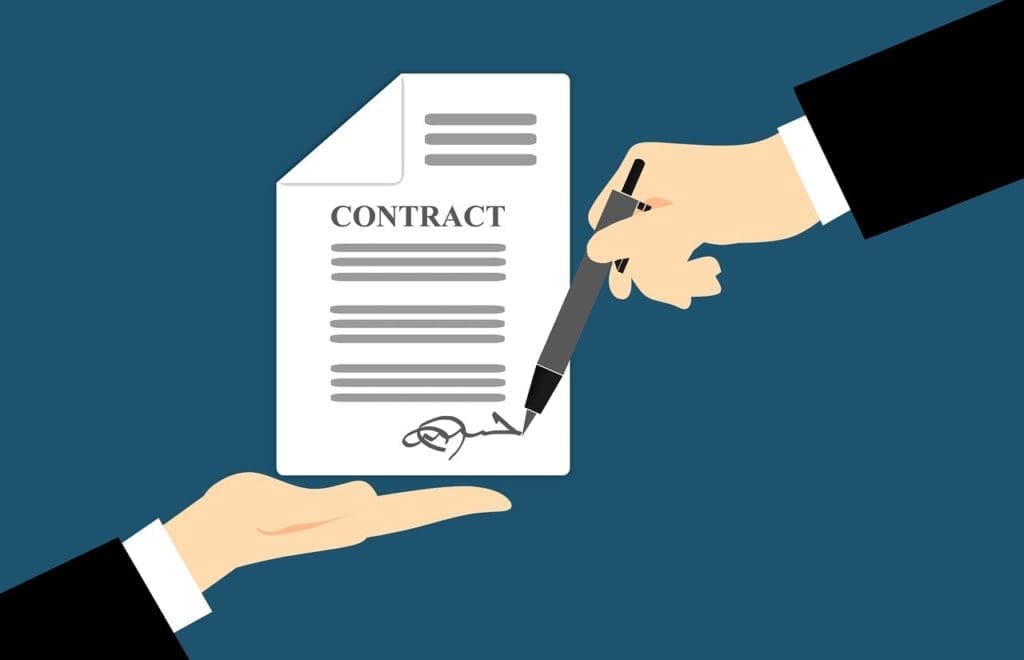
May marks not only the end of the academic year and the start of summer, but it also marks the beginning of the busiest season for moving - National Moving Month! When you're moving, there are numerous tasks to tackle, including packing your belongings, managing utilities, forwarding mail, updating voter registration, and more. As you prepare for your next move, there are two major tasks to take into consideration:
In all of the chaos of moving boxes and packing tape, it is easy for things to get lost in the shuffle or even thrown out during a move. Certain important documents, such as birth certificates, social security cards, passports, financial statements and estate planning documents, should not be packed up and put on the moving truck along with your less important belongings. Keep these important documents safe and accessible during your move and ensure that they do not get thrown out by accident.
One idea is to purchase a portable file box with an attached lid and a secure latch. You might consider purchasing a brightly colored one so that it is easily identifiable. Then, place this file box in a secure and easily accessible location. If you are moving locally, a logical place might be at a family member’s or friend’s home. If you are moving a longer distance, that place might be the trunk of your car.
Having electronic backup copies of your important documents is a wise decision, especially during a move. You can take pictures of your documents and save them on your smartphone or a password-protected removable flash or external hard drive. Another option would be to store it in the cloud. This way, you'll always have a copy of these important documents in case you cannot locate the original.
Adding this step to your moving checklist can save you time and from stress. For example, you will not have to run around searching through unpacked boxes for your children's birth certificates to register them for their new school.
When moving, it's important to not only contact the moving company, but also to reach out to your team of advisors. A major consideration is the cost associated with the move, which is influenced by factors like the size of your home, the distance of the move, and your preference for do-it-yourself tasks. To ensure your moving expenses align with your long-term financial objectives, it's advisable to consult your financial advisor and establish a moving budget.
It is recommended to contact your estate planning attorney if you are moving different states. While a will or trust created in one state should generally be valid in another, certain documents such as a financial or medical power of attorney may be state-specific. Due to the variations in estate planning laws across different states, it is strongly advised that you have your estate planning documents examined to ensure their effectiveness in your new state. You can have your attorney review the documents or they can assist you in finding a local attorney who can review them for you in your new state.
If you and your spouse are moving out of or into a community property state, your estate planning may be more complicated. In these states, any property acquired during the marriage is presumed to be owned equally by both spouses, while property brought into the marriage by one spouse or acquired by gift or inheritance is separate property. Moving from a community property state to a common law state or vice versa raises questions about the status of community property. For instance, if a couple purchases a home in California during their marriage and then moves to Nebraska and buys a new home with the proceeds from selling their California home, is the new Nebraska home community property? Your estate planning attorney can answer these questions and help you take necessary steps to maintain any tax benefits.
Moving involves many things to consider, but don't forget to keep your important documents secure and meet with your team of advisers. These are crucial items to add to your moving checklist. If you're planning to move soon, we would be more than happy to help you keep this as smooth as possible.

Every child is a precious gift, and as parents or grandparents, we strive to plan for their future, anticipating their needs and aspirations. However, families with special needs children or grandchildren face additional responsibilities in ensuring their loved one's future is secure, fulfilling, and supported. To ensure a flourishing future for your special needs child or grandchild, estate planning measures focused on their unique circumstances are essential. We recommend the following steps:
When it comes to estate planning, creating a Special or Supplemental Needs Trust (SNT) for your special needs child or grandchild should be a top priority. An SNT is a specialized trust designed to set aside funds and assets for the benefit of a beneficiary who may qualify for public assistance due to their disabilities. It can be established as a standalone trust or added to your existing trust.
It's important to note that government programs providing aid to disabled individuals have strict criteria regarding the amount of money and property a person can own while receiving benefits. Structuring any inheritance your special needs beneficiary may receive in a way that doesn't disqualify them from obtaining government benefits is crucial. Even if they are not currently receiving government benefits, considering the possibility of future needs is essential. To ensure all opportunities are available, it is vital that the trust is meticulously drafted by a lawyer well-versed in the eligibility requirements for government benefits.
An SNT not only provides financial security but also allows you to appoint a care manager or advisory committee. The care manager serves as an advocate for your special needs beneficiary, overseeing their well-being periodically or daily, depending on their level of care requirements. An advisory committee, comprising family members, friends, and professionals, can provide guidance to the trustee on the beneficiary's needs and the best use of the funds.
Additionally, the SNT can include a statement of intent, outlining the trust's purpose and how the funds should be utilized. This section acts as a safety net in case changes in the law make the beneficiary ineligible for government benefits. It allows for modifications to ensure your original intentions are met, even in the face of unforeseen circumstances.
In addition to establishing an SNT, putting your instructions in writing is crucial to ensure your wishes are carried out as intended. Consider creating a letter or memorandum of intent that provides guidance to your trustee on managing the trust after your passing. Although not legally binding, this document offers valuable insights into your true intentions. You can include details on how the funds should be used in accordance with government rules, specific goals you would like the beneficiary to achieve, and the standard of living you envision for them.
Supporting a special needs child or grandchild can be financially demanding, and it's important to consider how to sustain their care once you pass away. Life insurance can be a valuable tool in ensuring there will be sufficient funds for the trustee to use for their benefit. By designating the SNT as the beneficiary, you can provide a lump sum payment that is not subject to the same tax liabilities as retirement accounts.
The SECURE Act has brought changes to how beneficiaries can receive distributions from inherited IRAs, potentially impacting the financial support available to your special needs beneficiary. However, the Act also recognizes "eligible designated beneficiaries," including individuals with disabilities, who can still receive distributions over their life expectancies. Congress has established rules that allow the life expectancy of disabled beneficiaries to be used for certain types of trusts. If you have a substantial retirement account, it is crucial to discuss your distribution options to maximize benefits for all your beneficiaries.
We understand that securing a bright future for your special needs child or grandchild is of utmost importance to you. Our priority is to work with you in developing a comprehensive plan that will guarantee continued care and well-being for your loved ones. Please do not hesitate to reach out to us to schedule an appointment so that we can begin this process together.
When Elvis Presley, the King of Rock and Roll, passed away in 1977, he left behind a complicated legacy, just like his famous dance moves. His estate, including the iconic Graceland, eventually ended up in the hands of his only child, Lisa Marie Presley. However, the future of Elvis's legacy and the fate of his estate face challenges ahead. These challenges involve Lisa Marie's personal financial issues, a significant age gap among her children, and even a legal dispute initiated by her mother, Priscilla Presley. The unfolding of this captivating saga will determine the course of Elvis's rockin' legacy.

From Elvis to Lisa Marie: Inheritance and Financial Legacy
Lisa Marie, born in 1968 to the legendary rock and roll icon Elvis Presley and his wife Priscilla Presley, had to face the tragic loss of her father at a young age. Sadly, Elvis passed away at forty-two due to a heart attack. Fast forward to January 2023, and Lisa Marie herself succumbed to heart problems at the age of fifty-four.
Despite Elvis's untimely departure, his legacy has continued to thrive, with his estate earning an impressive $400 million in the previous year alone. The value of the estate skyrocketed to over $1 billion, thanks in part to the 2022 Elvis biopic movie. This created a substantial financial legacy for Lisa Marie to inherit.
The Elvis Presley Trust
When Elvis Presley passed away, his estate was placed in a trust with Lisa Marie, his grandmother, and his father as beneficiaries. According to the trust, Lisa Marie's inheritance was held in trust until she turned twenty-five in February 1993. After that, the trust dissolved automatically, and Lisa Marie inherited $100 million, including Graceland, her childhood home.
Today, Graceland stands as a museum and popular tourist attraction, generating over $10 million annually. To manage Graceland and the rest of Elvis's estate, which includes Elvis Presley Enterprises, Inc. (EPE), Lisa Marie established the Elvis Presley Trust. Until 2005, Lisa Marie served as the owner and chairperson of EPE's board, but she later sold 85 percent of its assets.
Graceland and the Living Trust
Graceland, the iconic mansion that was once Elvis Presley's residence, has become a symbol of his legacy and a beloved tourist destination. After Lisa Marie inherited it, she made it clear that Graceland would always remain within the family.
Lisa Marie's children, Riley Keough, Harper Lockwood, and Finley Lockwood, are set to inherit her fortune and properties through a living trust. However, Lisa Marie's son, Benjamin Keough, tragically passed away in 2020.
Considering that it's unclear whether Lisa Marie had a separate will in place, the living trust, an estate planning document, will play a significant role in determining the distribution of her assets. Through the living trust, individuals can transfer ownership of accounts and property to a separate entity, the trust, which they control while alive. The trust also names a successor trustee to manage the accounts and property after their passing.
Priscilla Presley's Trust Challenge
A challenge to Lisa Marie's living trust has emerged from an unexpected source—her own mother, Priscilla Presley. The legal dispute revolves around a 2016 amendment to the trust, which removed Priscilla and a former business manager as trustees and replaced them with Lisa Marie's daughter, Riley Keough, and her late son, Benjamin Keough.
Navigating the Challenges: Estate Planning and Protecting Your Legacy
Priscilla's claim challenges the validity of the living trust amendment, citing violations of legal requirements. She highlights the lack of proper notification, absence of witnesses or notarization, and even a misspelling of her name in the document. Adding to her concerns, Priscilla alleges that her daughter's signature appears suspiciously different from her usual signature. Consequently, she has sought the court's intervention to invalidate the amendment that removed her as the trustee.
Lisa Marie's Financial Struggles
Recent legal documents indicate that Lisa Marie faced financial challenges before her passing, despite inheriting $100 million at the age of twenty-five. She held approximately $95,000 in cash and possessed various assets such as bonds and stocks valued at $715,000. Although she earned over $100,000 per month from EPE, she also carried a $1 million tax debt and incurred monthly expenses of $92,000. Furthermore, her ex-husband, Michael Lockwood, reopened a lawsuit seeking $4,600 per month in child support.
By 2016, Lisa Marie's $100 million trust had significantly dwindled to just $14,000 in cash. Her former manager, Barry Siegel, faced allegations of mismanaging her finances, which resulted in a decline of her wealth. Court records reveal that Lisa Marie was burdened with a $16.67 million debt at that time. However, in 2019, Siegel countered the claims and asserted that the sale of her 85 percent stake in EPE helped resolve over $20 million in debts.
Potential Legal Challenges for the Lisa Marie Presley Estate
The legal ambiguity surrounding Lisa Marie's estate gives rise to numerous potential legal issues that will likely require judicial resolution. One such challenge is Priscilla's claim against the living trust amendment. If her challenge is successful, the amendment would be considered void, making Priscilla the successor trustee responsible for managing the trust's assets and funds instead of Lisa Marie's daughter, Riley. This matter would necessitate court intervention for resolution.
Creditor Claims
Although it remains uncertain whether Lisa Marie had outstanding debts, if she did, creditors could make claims against her estate. The estate would need to determine whether to accept or reject these claims. Rejecting them could lead to legal disputes. Creditors hold priority over beneficiaries, which means that Lisa Marie's accounts and property, including Graceland, might need to be sold to satisfy any outstanding debts. Additionally, even after the debts are settled, the estate may still be subject to estate taxes, which could further complicate matters if creditors decide to initiate lawsuits.
Her Daughters' Inheritance
Assuming the estate possesses sufficient funds to settle debts without selling Graceland, Lisa Marie's three daughters, Riley, Harper, and Finley, are poised to inherit the mansion and any remaining property or funds. However, the upkeep and tax costs associated with Graceland surpass $500,000 annually. It remains uncertain whether the daughters would collectively agree to bear these expenses and preserve the Elvis legacy within the family.
The daughters have the option to sell Graceland, but this decision could ignite internal conflicts if even one daughter wishes to pursue a sale. Additionally, crucial details regarding the ages of the daughters and their inheritances remain unknown. Did Lisa Marie establish a trust to hold her twin daughters' inheritances until they reach a specific age, as her father did for her? Or does the trustee possess discretionary power over the funds? Moreover, depending on the outcome of the trust challenge, will the trustee ultimately be Riley or Priscilla?
Furthermore, the question of whether Lisa Marie distributed her estate equally among her daughters remains unclear, as there is no legal requirement for equal distribution.
Control What You Can with an Estate Plan
The sudden and tragic passing of Lisa Marie Presley serves as a reminder that death can come unexpectedly. However, through estate planning, we can exert some control over our legacy.
Crafting a comprehensive estate plan can help alleviate some of the uncertainty and provide peace of mind to both ourselves and our loved ones. If you're ready to start planning for the future, please reach out to our office to schedule a consultation.

Estate planning is an important process that involves making arrangements for the distribution of your assets and property after your passing. While having an estate plan in place is crucial for everyone, people with disabilities need to get in touch with a Reno estate attorney even more.
Disability panels are groups of people who are appointed to oversee the management of an estate plan for an individual with a disability. This group, which may consist of close relatives, dependable friends, financial advisers, and attorneys, works to see that the disabled person's needs and wishes are fulfilled in the event of their incapacitation or passing. This is crucial because people with disabilities could have distinct needs that call for extra care and attention.
Disability panels offer a level of transparency and accountability not often found in conventional estate planning arrangements, which is one of its key advantages. By appointing a panel to manage your estate plan, you can be confident that your wishes are being carried out according to your intentions.
Knowing that there is a plan in place for managing a potential disability, everyone involved can feel more secure and prepared. Also, a disability panel can ensure that, in the event of a handicap, the person's desires are respected and carried out.
It's also worth noting that disability panels can be a valuable tool for estate planning. By including a disability panel in an estate plan, individuals can ensure that their wishes for care and decision-making are respected even if they become disabled. In addition to ensuring that the estate is managed in accordance with their wishes, this can help avoid family disagreements.
Disability panels can help prevent disputes among family members or other parties who may have conflicting interests in your estate. When there is a panel in place to manage your estate, there is less opportunity for disagreements or misunderstandings to arise. This can help ensure that your assets are distributed according to your wishes and can help prevent the unnecessary strain on relationships that can often result from disputes over an estate.
In addition to providing oversight of your estate plan, disability panels can also assist with other aspects of your care. For those with impairments, who might need extra care and attention to preserve their quality of life, this might be particularly crucial.
When choosing members for a disability panel, it is important to consider factors such as trust, competency, and reliability. You want to choose people who will be dedicated to carrying out your intentions and who are capable of administering your estate plan in a competent and ethical manner. This may include family members, close friends, or trusted advisors who have experience with estate planning or disability issues. The correct people must be chosen to serve on the disability panel in order for it to be effective. These people ought to be dependable, aware of the person's requirements and preferences, and capable of cooperating in decision-making. Clear rules and processes for the panel's operation and decision-making should be in place as well.
Disability panels can play a crucial role in estate planning for individuals with disabilities. By designating a panel to manage your estate plan, you can be certain that your wishes are being carried out exactly as you planned and that your assets are being dispersed in a fair and equitable manner. This can provide you and your loved ones peace of mind and help avoid disagreements or misunderstandings that frequently occur in conventional estate planning arrangements. If you or a loved one have a disability, it may be worth considering the benefits of disability panels in managing your estate plan.
For over a quarter of a century, the National Safety Council has designated June as a
month of paramount importance - a time to honor and prioritize safety at a national
level. This annual celebration, known as National Safety Month, serves as a powerful
reminder of the critical role that safety plays in our lives.
The aim of this month-long campaign is to increase public awareness about the most
significant safety and health risks faced by people in the United States. While many
people are aware of common safety hazards, such as physical injuries, they may not
realize that incapacity or death can result in substantial financial and emotional
consequences for themselves and their families. A revocable living trust is a legal tool
that can help protect you and your loved ones from the costs, uncertainty, and chaos
that may arise in the event of your incapacity or death.
Protection by a Revocable Living Trust for Yourself
Just like anyone else, you face the risk of experiencing a catastrophic accident or illness
that could leave you incapable of taking care of yourself or your loved ones. This
incapacity might be temporary, or it could last until your eventual death. The total cost of
incapacity can be difficult to calculate and can include lost wages, as well as the
expenses of required medical care. These expenses may include requiring assistance
with daily activities such as bathing, eating or dressing. However, it can quickly become
very costly - the average cost of assisted living in the United States in 2020 was
approximately $4,300 per month.
A revocable living trust is an essential legal tool that helps protect you and your loved
ones by providing instructions for how you will be financially supported during your
incapacity. With a revocable living trust, you can choose who will manage your finances
when you are no longer able to handle them yourself. There’s no better time than now
to establish a revocable living trust because it is revocable, which means that you can
change it at any time and alter it as your life circumstances change, as long as you have
the mental capacity.
Protection by a Revocable Living Trust for Your Loved Ones
Your loved ones’ financial and emotional well-being is also protected by a revocable
living trust. It ensures that your wishes are clearly outlined for what should happen in
the event of your incapacity or death. This prevents your loved ones from having to speculate
on your desires or worse, having to follow state law to determine who should handle your finances and end-of-life affairs.
Probate fees, which vary significantly by state, can also be very expensive. For
example, in California, attorney and executor fees for probating an $800,000 home
could be as high as $38,000, as set by law. A revocable living trust can help avoid
probate and those high accompanying fees.
Revocable living trusts also offer privacy protection. Without the instructions provided in
these trusts, family members often have to resort to public court proceedings. This
means that the court and other curious individuals may pry into your private affairs.
Furthermore, these types of trusts can provide basic martial deduction planning to
maximize the use of you and your spouse’s estate tax exemptions. This helps to reduce
your loved ones’ estate tax burden, after your death. Finally, by using this legal tool, you
can protect the money you leave to your loved ones from their creditors.
Properly Funding Your Revocable Living Trust
To ensure that a revocable living trust serves its intended purpose, it must be properly
funded. This means that any property you own must be transferred to the trust, or for
certain assets, the trust must be named as the beneficiary. Failure to properly fund your
trust may result in the need for probate. To avoid this, it is essential to review any
correspondence you have received from your attorney regarding which accounts and
properties should be owned by the trust or designated as beneficiaries. It is especially a
good time to do this in the month of June, which is National Safety Month!
Given the importance of the instructions contained in a revocable living trust, it is
advisable to review them annually to ensure that they still align with your final wishes. If
changes are necessary, it is recommended that you seek assistance from a
professional to update your trust accordingly. This will ensure that your trust continues
to serve you and your loved ones during times of incapacity and after your passing.

Prepare to be amazed! May is not just any ordinary month - it's National Home Remodeling Month, the time of year when the National Association of Home Builders officially recognizes the tremendous value of home improvement projects. Springtime comes with spring cleanings and home improvement projects, but can also be a good time to consider updating your estate planning documents.
If you need to make small updates to your estate planning documents, such as changing the names of beneficiaries or decision makers, you may wonder whether you can take care of these changes on your own or if you should seek the assistance of a professional. Here are some things to consider before choosing which option is best for you:
If Your Name Changes
If you've changed your name due to marriage and/or your own personal preference, and your estate planning documents don't need to be changed, you may only need to keep copies of any legal paperwork reflecting the name change. Keep copies of these documents together with your estate planning documents. If you've remarried and want to change your name in your estate planning information, or if a trust you established has your old name in the title, it's best to consult an industry professional, such as an attorney, to ensure that the name change is properly handled.
If a Beneficiary’s Name Changes
Wondering what you should do if your beneficiary's name changes? Whether it is due to marriage and/or personal preference, staying on top of this information can save you from running into issues later down the road. While updating your estate planning documents is not necessarily critical, it may be necessary for your beneficiary to prove their identity with a court order, marriage certificate, or birth certificate. It is important to avoid making changes directly on your estate planning documents, such as crossing out a name and writing in a new one. This has resulted in confusion and has even prompted litigation in the past. Courts have had to weigh in on these types of edits to estate planning documents to determine their validity and intent. Even though it may seem harmless, unforeseen consequences can often arise when attempting to edit legal documents yourself.
Adding or Removing a Beneficiary
When events occur such as the birth of a child or the passing of a beneficiary, you may wonder if you need to update your estate planning documents. The answer is that it depends on the language in your documents. Some estate planning documents are drafted to anticipate future additions or removals of beneficiaries by name. It is highly important to seek legal advice before making any changes to your estate planning documents, as serious legal consequences can result from attempting to do so on your own.
Making changes without legal advice could result in unintentionally cutting off people from receiving an inheritance or having your property go to those who never intended to benefit. For instance, adding a spouse’s name to the list of children in your estate planning documents could lead to unintended consequences if the spouse remarries after the child’s death. The former in-law could become a beneficiary of the family trust and have certain rights regarding the trust’s administration, including the right to demand a copy of the trust documents and any financial accountancy. Once that share is paid out, the former in-law might use it in a way that it was not originally intended for, causing negative consequences from an innocent and well-meaning attempt to provide for an in-law.
Appointing New Trusted Decision Makers
In some cases, you may want to appoint new individuals to make important decisions about your property if you become incapacitated or pass away. However, it’s important to understand that certain legal documents cannot be amended easily. While it may be tempting to simply cross off the names of the people you want to remove and add new preferred decision-makers, this can actually void the document under certain circumstances.
If you need to make such important changes, it’s best to have the documents redrafted and executed with the same formalities used in the original documents, ensuring that you follow the applicable state law. For instance, your state may require multiple unrelated witnesses to the signing of a modified will, even if the change you’re making is a one-sentence amendment. The same is true for a codicil, which is an amendment to your will. Other legal documents, such as a power of attorney, a trust amendment, or restatement, may also require similar formalities, such as having your signature notarized.
Modifying Distribution Provisions
There may be times when you consider altering the distribution provisions of your will or trust by changing the percentage/fraction shares of your estate. It is important to note that this modification should be avoided when attempting to make such changes on your own. It is always advisable to consult an attorney if you wish to modify the distribution provisions of your will or trust. You must consider this amendment very carefully and execute it with strict documentation. Such a change to your estate planning documents carries the risk that a beneficiary who receives less under the amendment may challenge it and use any argument available to invalidate the changes. An experienced estate planning attorney will know the necessary steps to take to ensure that your legal documents will be honored by your beneficiaries and the courts after you pass away.
As you have seen, remodeling your estate plan without the help of a trained and experienced attorney can lead to many potential issues. When handled properly, these changes don’t have to be expensive. Your attorney can quickly and inexpensively fix some of these small issues by drafting an amendment to your estate planning documents. Other changes may require more work because the issues are considerably more complex than you first realized. In either case, with a legal professional guiding you through the process, you can be confident that you will not be leaving your loved ones with a legal mess to sort out after you are gone.
If you are uncertain about whether you need an attorney to help you modify your estate plan, we encourage you to contact us. We are happy to consult with you and help you determine what changes, if any, you may need to make.
Back in 1987, Congress recognized March as Women's History Month to celebrate the incredible contributions of women in American history across various fields. From building a strong and prosperous nation to being the backbone of their families, women have been unstoppable. Yet, in the midst of caring for others, women often neglect their own financial and estate planning. It's high time for women to prioritize themselves by crafting a solid plan that caters to their future needs, which may differ from those of their male counterparts and dependents.

Longer life expectancies. According to Social Security Administration data, in 2021, women had an average life expectancy of 79.5 years compared to 74.2 years for men. As a result, it is important for women to create an estate plan that accounts for additional years of living expenses during retirement, healthcare costs, and possibly long-term care costs. As women age, there may be a greater possibility that they could become incapacitated and need someone to act on their behalf to make financial and healthcare decisions. Documents such as financial and healthcare powers of attorney and living wills authorize a person they trust to make decisions or take action for them if they are not able to act for themselves. Some women may not only own their own assets but also inherit wealth from both their parents and a spouse who dies before them, and if so, they need a financial and estate plan to optimally preserve and transfer this wealth. Because women may outlive their spouses, they also may be responsible for administering their spouse’s estate or become the sole surviving trustee of a joint trust. These duties may be difficult for a woman who is experiencing health issues that often occur at an advanced age, and this possibility should be addressed in their estate planning. For example, a woman concerned that she will be unable to handle administering her trust at an advanced age can name a co-trustee or successor trustee to administer it if she is no longer able to do so.
Lower earnings. According to U.S. Census Bureau data, women continue to earn less than men, and the pay gap widens as they age. In addition, because some women have shorter employment histories due to time off to raise children or care for aging parents, they may have less saved for retirement. As a result, it is important for them to take steps to protect their money and property from lawsuits or creditors’ claims. For example, a woman could transfer her money and property to an irrevocable trust. Because she is no longer the legal owner of the property, a creditor cannot reach it to satisfy claims against her so long as the trust is properly drafted to include appropriate distribution standards and administrative and other provisions. The woman may be a discretionary beneficiary of the trust, and the trustee may distribute the funds she needs for living expenses. Additionally, because they have less money and property during their retirement, women need to have a solid plan in place to make sure that they are able to financially provide for their loved ones upon their death and that unnecessary costs and expenses are minimized to the extent possible.
Care for loved ones. Many women are caregivers for minor children, adult children with special needs, or aging parents. As a result, they are often concerned about who will care for their loved ones if they are no longer able to do so. If a spouse or sibling is not available to provide care, they need to make sure that another family member or trusted individual can be the caregiver (sometimes called a guardian of the person) for their loved one. The same individual—or someone else—can serve as the guardian of the loved one’s estate (sometimes called a conservator or guardian of the estate) to manage the inheritance for their benefit. In the case of a child with special needs, if no family member is able to take on the responsibility of their care, a group home or assisted living facility may be the best choice. A special needs trust may need to be established to ensure that funds are available for the child’s care but do not decrease the amount of government benefits they are eligible to receive.
You have accomplished a lot in your life! Celebrate your accomplishments and contributions during Women’s History Month by contacting us to set up an appointment to create an estate plan that provides for your own future needs and those of the people you love. You deserve the peace of mind that comes with knowing your future is secure.
In October 2022, singer and songwriter Jerry Lee Lewis passed away. He left behind a rock legacy, a big family, and an estate valued in the multi-millions.
We often follow the lives of celebrities and dream of having their lavish lifestyles. Even so, famous folks experience many similar estate planning challenges just like the rest of us. This includes implementing the optimal tax strategy, as well as distributing assets to loved ones when deceased.
Lewis’s passing has prompted many to look back fondly at his music career. Aside from that though, it begs the question: what will shake out with his sizable estate? Let’s play “what if” in the following estate planning scenarios and see which lessons can be learned for celebrities and regular folks alike:

Jerry Lee Lewis lived a long life, passing at the old age of 87. Like other rock icons of the last century (Elvis, Johnny Cash), Lewis’s lifestyle put hard miles on him. Even though he engaged in substance abuse and experienced health problems, he outlived other leading rockers and was deemed “the last man standing from the dawn of rock and roll” by New York Magazine.
You likely have heard his greatest hit, “Great Balls of Fire”, but Lewis had a variety of other hits that earned him four Grammy wins. Lewis was inducted into both the Rock & Roll Hall of Fame and Country Music Hall of Fame. His music career spanned for an astounding seven decades, and he produced over forty albums.
At his death, Lewis left behind his seventh wife, Judith Coglan Lewis, and four of the six surviving children from his marriages. In the years preceding his death, a feud ensued between Lewis and his daughter, Phoebe, and her husband, Ezekiel Loftin. Lewis sued the Phoebe and her husband in 2017 for taking advantage of his financial status. Charges were later dropped.
Lewis had his fair share of financial missteps, filing for bankruptcy in 1988. The filing included more than $3 million in debts. This came from over $2 million in IRS dues, unpaid medical bills, and tens of thousands in attorney fees. Still, his net worth at the time of his death was estimated to be in the range of $10 million and $15.4 million.
As professional estate planning attorneys, we evaluate the life and legacy of Jerry Lee Lewis through the perspective of our field of expertise. While his tumultuous and fast-paced lifestyle may not align with our personal experiences, we recognize the valuable insight it provides in regards to common estate planning issues. In this discourse, we will address several issues related to Lewis's estate that are particularly noteworthy.
Based on what we know about Lewis’s relationship with his daughter, Phoebe, it is likely that he will remove her from any consideration to receive a portion of his assets. Mississippi law permits individuals to disinherit beneficiaries under a legitimate basis. However, it is worth noting that Phoebe has established her own career in the music industry and has done quite well for herself, potentially rendering any inheritance unnecessary.
The distribution of assets for his remaining children is yet to be determined. While most parents opt for equal distribution of assets among their children, the unique circumstances of the Lewis family dynamic require analysis of what is equal versus what is fair.
We can take lessons away from the Lewis family and apply them to our own situation. Each child has financial needs unique to their lives. While some are able to obtain financial freedom, others may struggle. A family’s financial picture can change for better or for worse between the birth of children as well. For instance, a younger child might enjoy a slightly more affluent lifestyle than the older siblings, simply because their parents have worked their way to a better career milestone and are making more money now than they were. This is why dividing assets equally within an estate plan is not always the fairest method for all parties.
Will He Transfer Assets to His Surviving Spouse?
Lewis was married a staggering seven times, and each came with their own controversies. His seventh wife was by his bedside upon his death. Will he distribute assets to her?
In the case that Lewis did not have a will in place, intestate law would take effect. This would automatically make his spouse the primary beneficiary. It’s not a far off scenario – about two thirds of American adults fail to compose a will. Rock icons can fall into this category if they fail to do some basic estate planning before death.
In the case that Lewis did have a will, he still could have left his entire estate, or a portion, to the surviving wife. If he just left a portion, those assets could be given to her as a lump sum, or distributed over time under the management of the estate’s trustee.
Lewis also would have had options deciding the type of trust set up. The pros and cons of these different types are as follows:
Even though death and taxes are certain in life, estate taxes may not fall into this category. It all depends on the breadth of the estate at Lewis’s death, and the amount of the lifetime exemption used.
The lifetime gift and estate tax exemption denotes the maximum amount of wealth that an individual can pass on to their heirs without incurring estate taxes. Such transfers can take place either as gifts throughout a person's lifetime or at the time of their death.
In 2022, the federal lifetime gift and estate tax exemption threshold was $12.06 million, rising to $12.92 million in 2023. Based on the conservative estimate of Lewis's net worth, the value of his estate is lower than the 2022 lifetime exemption limit. Therefore, in the absence of any previous use of his exemption during his lifetime, he may not require workarounds for estate taxes if his spouse does not posses substantial personal assets. It is worth noting that for couples, the exemption amount doubles to $25.84 million in 2023.
Mississippi does not impose an estate tax, so Lewis's estate does not need to worry about such a tax being levied. However, if Lewis had passed away in a state that imposes an estate tax, or if he had owned property in such a state, then his estate might have been subject to an additional tax due to his death. The exemption amount and tax rate for each state's estate tax are determined by that state.
In the case that Lewis's spouse does possesses assets and wealth that surpass the individual gift and estate tax exemption limit, it may behoove her to ask for the deceased spousal unused exclusion (DSUE) amount. The DSUE provision, aimed at helping the surviving spouse, allows the unused exemption amount of the deceased spouse to be transferred to the surviving spouse in case the former did not use up the entire exemption amount. In simpler terms, Lewis's wife would be eligible to receive a DSUE amount of $2.06 million, calculated based on the 2022 exemption of $12.06 million and Lewis's estimated estate value of $10 million.
Based on the 2022 exemption of $12.06 million and an estimated estate value of $10 million, Lewis's wife would be eligible for a DSUE amount of $2.06 million.
It is impossible to know for sure how Jerry Lee Lewis chose to allocate his wealth. His wife and children may be as uninformed as the general public, and there could be unexpected elements in his estate plan that have yet to surface.
The Lewis family requested that instead of sending flowers for his funeral, contributions be made in his name to either the Arthritis Foundation or MusiCares. It raises the question whether Lewis may have chosen to allocate a significant portion of his estate to these or other charitable organizations instead of his family.
Only time will tell how it’ll play out. We may not even get the full story if he left his estate to charity, since it’s common for charity information to stay private.
Ironing out an estate plan is not exclusive to rock-and-roll icons. Regardless of the complexities of your estate, it is essential to develop a plan for the distribution of your assets, settling your debts, and ensuring that your wealth goes to the individuals and causes that matter to you. Contact Anderson, Dorn & Rader’s office today to arrange a consultation with our team of estate planning attorneys and begin planning for the future.
You may have seen the popular ABC TV show, Modern Family, which follows a fictional extended family through life’s ups and downs. It’s a relatable show that addresses many issues life throws our way. Just like the families depicted in the series, it’s crucial to have an estate plan to protect loved ones when someone passes, or becomes unfit to manage their finances. Let’s take a look at some situations that arise in Modern Family episodes and how you can apply the lessons learned to your own estate planning.

Throughout the Modern Family series, various family members start and own businesses. Whether it’s a passion project, investment opportunity, or owner-operator business, it should have a plan for the future as part of your overall estate planning.
The “traditional” lines in familial relationships can get blurred within multi-generational, blended families. For example, Jay often refers to Manny as his son, even though he’s technically his stepson (the child from Gloria’s previous marriage). Though he loves Manny as if he were his own son, the law doesn’t take these emotions into account when it comes to transferring business interests. Legally, stepchildren have no right to inherit a stepparent’s money or property. In situations like these, proper estate planning is essential. Estate planning should include documentation to ensure that assets, including business interests, are left to stepchildren or others outside the traditional inheritance line if that is your wish.
There are several minors within the Modern Family series that would require guardianship in the event that their parents pass away. While Manny expressed a desire to serve as Joe's guardian if Gloria and Jay pass, it is important for them to formally nominate their preferred guardian in their wills. However, it should be noted that such a nomination is not binding and may be contested by others. To mitigate the risk of potential disputes and ensure Joe's wellbeing, it is advisable for Jay and Gloria to have open and candid discussions with both of their families to prevent any possibility of a guardianship dispute.
Rex and Lily would also require guardianship in the event of the passing of their parents. Without a comprehensive estate plan in place, it is possible that a dispute may arise between the families of Cameron and Mitchell. While Lily has spent a significant portion of her life close to Mitchell's family, later in the show, Lily and Rex move to reside with their parents in Missouri, which is closer to Cameron's family. As a result, Rex may develop a stronger bond with Cameron's family as he grows up, which could potentially lead to conflicts between the Pritchett and Tucker families if guardianship for these two children becomes necessary. To avoid such a scenario, it is imperative for Cameron and Mitchell to establish an appropriate estate plan.
Finally, it is important for Poppy and George to have designated guardians in the event that their parents, Haley and Dylan, die. While the family may not possess significant financial assets or property, it is crucial for them to establish basic plans for their children's care, including the appointment of primary and alternate guardians. When the show ends, Haley and Dylan have moved out of Phil and Claire's residence, but still nearby. Furthermore, it is noteworthy that Farah, Dylan's mother, has become increasingly involved in their lives since the announcement of Haley's pregnancy. It is possible that she may express an interest in assuming the role of guardian for the children in the event of the untimely passing of Haley and Dylan.
As a parent of minor children, it is crucial to consider and plan for the potential guardianship of your children should the unexpected occur. While no one can replace a parent's love and care, it is essential to formally nominate a guardian in a last will and testament or through a separate legal document, as permitted by state laws. While the court ultimately makes the final determination, clearly expressing your wishes can provide peace of mind. Furthermore, discussing potential guardianship with your family members in advance can help prevent disputes and ensure that your wishes are respected upon your passing.
As all married couples know, the question of what will happen in the event of the first spouse's death is important to consider. For couples like Phil and Claire, who have built and accumulated their assets during the course of their marriage, it may be natural to consider everything they own as jointly held. Both partners may wish for all assets to pass to the surviving spouse. However, without proper planning, leaving assets outright to a surviving spouse can leave them vulnerable to creditors and predators.
It is important to consider potential scenarios, such as the possibility of a scam artist exploiting a well-intentioned person like Phil, or a successful woman like Claire remarrying and unintentionally disinheriting her children by leaving all assets to her new spouse. To safeguard assets for the surviving spouse, regardless of whether it is their first or third marriage, a qualified terminable interest trust can be an effective solution. This designation of trust allows the surviving spouse to receive annual income from the trust and withdraw principal for specific purposes like health, support, education, and maintenance. It also grants you the power to choose where any remaining assets are allocated upon the death of your spouse.
In blended families, as seen on Modern Family, there are a variety of options for inheritance distribution. As Jay prepares his estate plan, it is important for him to consider how he wishes to divide his assets among his family members. This includes his spouse, two adult children from a previous marriage, a minor son, and an adult stepson, as well as five grandchildren and two great-grandchildren. He will need to make decisions regarding the distribution of assets, including the beneficiaries, the amount, and the timing of the distribution. He will need to consider whether it would be more beneficial to provide for his current spouse, Gloria, through a trust during her lifetime, with the remainder going to his other children, Claire, Mitchell, and Joe upon her death — or if his children should receive their portion of the inheritance while Gloria is still alive. Additionally, he will need to decide if he wants to provide for his stepson, Joe, or leave that responsibility to Gloria if she survives him. With estate planning, this could all be resolved.
When formulating an estate plan, it is crucial to consider the legal requirements for providing for a surviving spouse. In certain jurisdictions, there is a mandated minimum inheritance, known as the elective share, that must be allocated to the surviving spouse. Additionally, in states with community property laws, a surviving spouse may be entitled to a portion of assets acquired during the marriage. While one may assume that their spouse can support themselves without an inheritance, it is essential to have open and thorough discussions about estate planning, and document any agreements to ensure that the surviving spouse's rights and needs are protected. Without proper planning and documentation, a surviving spouse may unhinge the distribution of assets if they have not been taken into consideration within the estate plan, and haven’t waved their minimum inheritance rights.
Phil and Claire will need to evaluate their familial situation and incorporate estate planning to devise a plan for distributing their assets among their children and grandchildren. Given the distinct characteristics of their three children, it is important to consider each of their individual needs. For example, Haley, as a mother of two, may require a larger portion of the inheritance to support her children. Through careful estate planning, Phil and Claire may elect to set aside a specific fund for their grandchildren. Alex, who is very smart, may not require as much financial support due to her education or employment opportunities. Luke, on the other hand, may benefit from estate planning that includes trust money to help him pursue his business ventures and protect him from impulsive decisions.
An estate plan is a valuable tool for ensuring the protection of assets and financial resources for families of all sizes and backgrounds, not only those depicted in television series. The estate planning attorneys at Anderson, Dorn & Rader are dedicated to collaborating with families to develop a personalized plan that reflects the unique characteristics woven into each one. Reach out to our knowledgeable staff to see how we can assist your modern family with a financial plan for the future.
Death is a delicate subject, but can be made simpler with proper planning. In the best case scenario, all paperwork and assets associated with a passing loved one is prepared with the utmost detail prior to death, allowing friends and relatives to fondly remember the deceased and take time to grieve.
Anderson, Dorn & Rader, and the estate planning business as a whole, aims to simplify the legal processes surrounding death so legacies can be transferred to surviving loved ones in a fair, stress-free manner. To accomplish this, savvy individuals will often take measures to ensure they don’t burden their surviving relatives with undue complications like the probate process.
Several tools are available through qualified attorneys to keep your property and monetary assets out of probate. Among these, establishing co-ownership of bank accounts and home titles, as well as lining up beneficiaries on investment and insurance accounts are great to start with. But a revocable living trust is one of the most favored comprehensive options that an individual can set up to avoid probate. Let’s check it out:

A trust is a fiduciary arrangement that grants a third party, or trustee, the legal permission to hold and manage assets on behalf of a beneficiary or beneficiaries. A living trust is enacted while an individual is still alive, rather than upon death. Arrangements can be made to grant you oversight duties on your own living trust until you become incapable of soundly managing your assets, or pass away. Upon your incapacitation or passing, the successor trustee assumes responsibility over the assets in the trust and manages them on behalf of all involved beneficiaries.
The Probate process involves transferring ownership of all monetary assets and property that haven’t been assigned to beneficiaries, or don’t contain a pay-on-death or transfer-on-death designation upon your passing. Often times with probate, the court gets involved, and the long-winded process to account for the assets ensues.
With a trust, your assets are ready to be transferred to your beneficiaries upon your death, if they haven’t already been transferred to the trust while you’re still alive. This puts probate out of the question, as your assets are all accounted for and can be distributed in a timely manner.
Even better, trusts can incorporate pretty much any category of asset: from real estate, to stock holdings, to bank accounts, to family heirlooms. This keeps your legacy from being administered through the probate court, ensuring everything you worked for ends up in the hands of the individuals you deem as successors. Not only does this eliminate costly court costs, but it keeps your records out of the public’s eye and enables beneficiaries to remember the deceased and carry on the good fortune of the trust without running into road blocks.
The language and investment surrounding the establishment of a trust can be daunting, often prompting individuals to delay the process or put it off entirely. But to plan without a doubt where your assets will end up, and with whom, it’s vital to create a trust. It’s peace of mind for both you and your loved ones when you pass.
Planning the details around your death is sometimes a difficult topic to breach, but can be made simpler with the help of your family and knowledgeable attorneys like Anderson Dorn & Rader. While you are ultimately at the helm when it comes to important decisions, our estate planning group truly cares about maximizing the legacy you will leave to your loved ones. For any questions about how to start the trust formation process, please give us a call or fill out our contact form. We look forward to bringing you and your family peace of mind.
The days are flying by, and before you know it, the New Year will be here. Plan ahead and fine-tune your gift giving before the holiday chaos ensues. It’s possible to make annual, medical, and educational exclusion gifts that aren’t technically considered as such under federal gift tax law.

Annual exclusion gifts are one type that you can give that do not trigger federal gift tax. For the year 2022, the gift tax threshold is $16,000 per person. That is expected to increase to $17,000 in 2023.
With annual exclusion gifts, assets amounting to $16,000 or less that are given to an individual within the calendar year are not considered gifts (for tax purposes at least – the recipients will still be thankful!).
Hypothetically, that means you can gift assets amounting to $16,000 or less to as many individuals you’d like up to December 31st of this year, then follow that gifting criteria again for the same recipients on January 1st, 2023 without having to file them under federal gift tax law.
Some sources may indicate that married couples are able to effectively double the annual exclusion amount ($32,000 per calendar year). Even if a married couple abides by this threshold, in some cases they may still be required to file a gift tax return. We recommend consulting our estate planning services to see if you need to report these “split gifts”, as they’re referred to.
Qualified medical exclusion payments / gifts are another type of transfer that aren’t considered ‘gifts’ under federal tax law.
To take advantage of medical exclusions, one must make a payment directly to a healthcare institution or medical insurance provider. Generally, this exclusion can be applied to any medical expense qualifying for a deduction under federal income tax guidelines.
For instance, you could have given $20,000 to the hospital that your grandchild was treated in for an emergency procedure earlier in the year, then give the same grandchild up to an additional $16,000 amount before December 31st, 2022. You could even go as far as to gift another $16,000 on January 1st, 2023. Even in this extreme example, these gifts would not trigger the federal gift tax threshold, as long as they are accounted for and transferred with the exclusions in mind.
An important note: the medical exclusion gift / payment must be made directly to the medical institution or medical insurance provider, not the individual receiving the medical care or insurance money. Even if the payment is “earmarked”, the patient cannot touch it, or the federal tax law will kick in and consider it a gift.
Gifted assets that meet the criteria of educational exclusions are another type of transfer that aren’t considered ‘gifts’ under federal tax law. This includes qualifying payments made directly to both domestic and foreign institutions.
So hypothetically, you could pay for your grandchild’s emergency procedure (referenced above), pay for their educational tuition amounting to $25,000, give them an additional $16,000 by December 31st, then give them $16,000 on January 1st, 2023. That’d be one thankful grandchild, and you likely wouldn’t trigger any federal gift tax returns.
Remember two things before initiating an educational exclusion gift: First, the payment must be made directly to the educational institution, not to the individual enrolled. Next, the payment can only be put towards tuition. Not supplies, books, dorm payments, or other related educational expenses.
It can be exciting to gift money and property to loved ones. After all, they will carry on your legacy in the future. While it’s tempting to simply transfer it to the recipient’s bank account, consider the guidelines surrounding annual, medical, and educational exclusion gifts to avoid the burden of taxes and maximize your financial picture. For assistance in doing so, contact the experienced Reno estate planning attorneys at Anderson, Dorn & Rader. We are happy to walk you through the process to make it enjoyable for all parties involved.
Estate plans are more than your monetary net worth. Categories of your estate can include real estate, pets, possessions and all other property you own. Some people forget how priceless personal property, such as family heirlooms and keepsakes, can be to those you leave behind.
It is important to work out what will happen to these valuable items after your death by creating an estate plan.
Heirlooms have been passed down to family members for generations. These items can vary in monetary value, but the memories attached to them are copious, giving them an emotional and sentimental value that shouldn’t be discarded or auctioned after your passing.
Keepsakes are slightly different from heirlooms because they apply to specific items you owned during your life. These items can be anything from cutlery sets, furniture, or jewelry that you left behind for your family. While these valuable items only have been passed down once, they have nostalgia your family wouldn’t want to lose.

Family members can have different values associated with certain heirlooms and keepsakes. It can be crucial to talk with each family member about their feelings and expectations towards certain items in advance. This common knowledge will help your family avoid unnecessary fighting for heirlooms or keepsakes after your death.
It is a good idea to decide if you need to have your family heirlooms or keepsakes appraised. By doing this, you provide your heirs with the necessary documentation to understand the value of each object passed down to them. Plus, you might realize you want to get some of these items insured due to their worth. Handling this before you pass will make it easier for your heirs to go through the mourning process and avoid unnecessary externalities.

There is no proper way to distribute these valuable and irreplaceable items after your death. Of course, these valuables could end up lost or undervalued if they end up in the wrong hands when there is no plan in place for family heirlooms and keepsakes.
Here are some ways to distribute these precious items to your heirs.
Some people prefer to equally distribute heirlooms and keepsakes to their heirs by focusing on each items' monetary value. An estates planning attorney can offer you guidance when understanding the liquidity of each family heirloom and keepsake.
It is important to note more than two of your heirs may desire the same heirloom or keepsake. You can resolve this dilemma before you pass by creating a personal property memorandum. This document is a chance for you to explicitly state your wishes and avoid any conflict that may come after your death.
One benefit to this type of inheritance planning is that a property personal memorandum is referred to as your last will and identifies who is to receive said property. Also, you don't need to execute a new will or amend your trust if you decide to make modifications to which heirs receive these family heirlooms and keepsakes.
You may prefer to gift special items to your heirs before passing away. Doing this could be a consideration if you find enjoyment in seeing how your family reacts to receiving their heirloom or keepsake.
Of course, you don't want to forget the gift tax you may incur after giving any items to your heirs while alive. Furthermore, you may want to consider if you should factor them into what share of your estate your heirs receive after your death depending on their value.
Anderson Dorn and Rader’s attorneys have the expertise and knowledge to help you create an estate plan that considers all your assets. Family heirlooms and keepsakes are just one piece of the puzzle. Define all your wishes for what your heirs receive with an estate plan to help avoid conflict between your heirs later on.
Many Northern Nevadans know the dangers that come along with this time of year. A 2019 statistic showed that 17% of all accidents happen during winter conditions, highlighting an increased chance for individuals to experience an accident due to extreme weather changes. Ultimately, no matter how long you’ve lived in the region, less sunlight, alongside rain, snow, and black ice creates challenges for anyone driving on the road. While no one ever thinks they will fall victim to an accident, knowing what to do after a fender bender is crucial to ensuring a headache-free experience.

Following these guidelines can help you document the incident calmly and efficiently.
While many people believe there is no reason to immediately report minor accidents, following these steps avoids unnecessary complications and significant penalties down the road.

If an accident occurs making you unable to speak or communicate decisions clearly, you will need to have someone talk to medical professionals on your behalf. This should be a previously planned and trusted individual who would be deemed your medical power of attorney. This person will arrange treatment with doctors until you regain consciousness, so it's crucial you've assigned this power to someone. Your medical power of attorney will expedite medical treatment in the case of an emergency. Furthermore, your medical power of attorney should know where to obtain a copy of this documentation to help expedite treatment.
Opting for minimum coverage can be detrimental to your savings and property in the event of a serious lawsuit. You and your car must be fully covered to prevent this from happening. Plus, you should speak to your insurance broker to find out if umbrella insurance makes sense for you. Umbrella insurance is a low-cost way to gain extra liability coverage and protect yourself from damages that may exceed the limits of your car insurance. Umbrella insurance ensures you have access to a bigger pool of money in the event of a car crash lawsuit against you, protecting your savings and future prosperity.
After a car accident with significant property damages and medical injuries, it may feel necessary to protect your assets from excessive lawsuit demands. You may attempt to do this by transferring funds to friends and family, but be careful because this is against the law in some states. These transfers used to protect assets won’t be ignored by the courts. If considered fraudulent, court judges have the full right and power to reverse transfers. This means that these assets can be obtained by the party in the event of a successful lawsuit against you even after being gifted to a friend or family member.
Revocable trusts are used to protect your assets and trust from creditors and lawsuits after your death. Unfortunately, while some people believe that these trusts protect their assets during their life, this is a misconception and not their design. These trusts fail to completely protect your assets because you have complete control of all assets placed in a revocable trust. Your ability to control these trusts means a judge can order you to revoke the trust to pay creditors and lawsuit judgments.

However, with the guidance of an experienced asset protection and estate planning attorney, you can use properly designed strategies to enhance protection for your assets and property. That means taking the time to sit down with an experienced attorney well before an accident occurs offers you the best chance to maximize asset protection for your estates.
SPEAK WITH AN ESTATE PLANNING ATTORNEY
Contact us today to see how AD&R can provide you with the finest legacy and wealth planning advice Northern Nevada has to offer. We help get you the proper insurance and design estate planning to help you overcome unexpected lawsuits after an accident. Give us a call today so that we can help prepare you for the perils winter might bring.
To date, twenty-four states have enacted or introduced model legislation referred to as the Uniform Voidable Transactions Act (Formerly Uniform Fraudulent Transfer Act). The full text is available on the website of the Uniform Law Commission at https://www.uniformlaws.org/committees/community-home?CommunityKey=64ee1ccc-a3ae-4a5e-a18f-a5ba8206bf49.
You’ve had your trust documents drafted and signed, now you assume your estate plan is in place and no further action is required. Unfortunately, this is not all that needs to be done to ensure your estate plan is effective. For any trust to have actual value, it needs to be funded.
The process of funding your trust is essential to leave property, cash, and other assets to your beneficiaries. Learn more about trust funding and proper titling below.
 Funding is the process of moving assets, such as money and property into the appropriate trust. To fully understand funding, imagine your trust as an empty bucket. The bucket by itself doesn’t offer much usefulness, but once you fill the bucket up, it has a purpose. Trusts function similarly in that they are only useful when they have money or property in them.
Funding is the process of moving assets, such as money and property into the appropriate trust. To fully understand funding, imagine your trust as an empty bucket. The bucket by itself doesn’t offer much usefulness, but once you fill the bucket up, it has a purpose. Trusts function similarly in that they are only useful when they have money or property in them.
The funding process involves retitling your assets in the name of your trust. Bank accounts, property, and any other assets will need to be titled in the trust’s name in order for them to be included in that trust, otherwise, it will remain empty. This can be done in one of two ways:
By doing this, your trust can be easily handed over to a successor trustee to manage in the event of your incapacitation - without the need for court intervention. Your successor trustee will have the right and responsibility to use the assets placed in the trust for you and your beneficiaries while you are unable to manage those things on your own. Fortunately, fully funded living trusts are exempt from the probate process, which provides a superior method of managing the trust for streamlined asset distribution and much more.
To properly fund your trust, you’ll need to work with the financial organizations you bank with to transfer ownership of your accounts into the trust’s name. Any real property you own will also need to be transferred into the trust’s name which may require a new deed to be signed with the correct information. Take a look at some of the common types of property that can be included or funded in your trust:
Accounts including checking, savings, money market, and certificate of deposit (CD) should all be regularly funded to your trust. To do this, you’ll need to work with the bank or credit union in which you have accounts to retitle them into your trust’s name. Commonly, you will be required to provide a certificate of trust that contains information the financial institution will need to complete the transfer. Just be sure that there are no early withdrawal penalties for retitling your CD accounts.
 Real estate may refer to your personal residence or another property (commercial, residential, or industrial) owned by you. Real property refers to the interests associated with property such as mineral or timber rights. Both types of property will require the help of an estate planning attorney to prepare the appropriate documents and ensure the property deeds are signed and sealed specifically for your trust.
Real estate may refer to your personal residence or another property (commercial, residential, or industrial) owned by you. Real property refers to the interests associated with property such as mineral or timber rights. Both types of property will require the help of an estate planning attorney to prepare the appropriate documents and ensure the property deeds are signed and sealed specifically for your trust.
Investment accounts will also need to be transferred into your trust’s name which can be accomplished through your financial advisor or broker of a custodial account. To do this, a certificate of trust is often necessary for proper retitling of your investments.
Personal effects may include items such as jewelry, furniture, clothing, photos, artwork, collections, tools, vehicles, and more. You can easily move these items into your trust by signing an assignment of personal property.
In regards to your life insurance, it’s best to name your trust as the primary beneficiary of the policy so that the trust has authority over the earnings garnered from said policy. It is then customary to name loved ones or other special persons such as a spouse, partner, or child as secondary beneficiaries. Most insurance companies have processes in place that allow these changes to be made easily. To change the primary beneficiary on your life insurance policy, contact your insurance agent to get the proper beneficiary designation forms filled out and filed.
 Retirement assets may include individual retirement accounts (IRAs) and 401k plans. Typically, it is not recommended to transfer ownership of these accounts to your trust due to the serious tax implications they pose for the plan’s owner. Before you assign your trust as the primary beneficiary on your retirement accounts, it’s crucial that you understand the potential tax consequences associated with this plan of action. Fortunately, your estate planning attorney can help you assess these risks and make the most appropriate decision for you.
Retirement assets may include individual retirement accounts (IRAs) and 401k plans. Typically, it is not recommended to transfer ownership of these accounts to your trust due to the serious tax implications they pose for the plan’s owner. Before you assign your trust as the primary beneficiary on your retirement accounts, it’s crucial that you understand the potential tax consequences associated with this plan of action. Fortunately, your estate planning attorney can help you assess these risks and make the most appropriate decision for you.
The most common types of property are listed above, but these aren’t the only assets that you may want to be funded into your trust. To ensure that your legacy goes to the appropriate beneficiaries, and to avoid probate, it’s important to include all of your assets in your trust. Some of the other types of property that should be funded into your trust include:
Your estate plans matter more than you may think. While many people assume they don’t have adequate assets to warrant the need for a living trust or other types of estate plans, this isn’t the case. Reputable estate planning attorneys can help you develop an effective estate plan that safeguards your assets and ensures your legacy for generations to come.
Connect with Anderson, Dorn & Rader today to have your trust documents drafted and titled, and your trusts properly funded. We’ll help you retitle your accounts and ensure correct ownership of your property for an effective estate plan.

In the event of your incapacity, it’s crucial that you begin estate planning to set processes and prepare documents such as a last will and testament or revocable living trust to safeguard your assets. Congress determined that due to the importance and benefits estate planning has for Americans and their families, it was necessary to bring awareness to the cause. Thus, since 2008, the third week of October has been recognized as National Estate Planning Awareness Week. While the onset of COVID-19 did encourage a majority of us to begin thinking about the future, many American families are still severely lacking an effective estate plan with just one-third of adults in the U.S. having documented wills or trusts. If you assume that estate planning isn’t for you because you haven’t acquired mass wealth or several large assets, you’d be mistaken.
Estate planning is simply a way to protect your assets and your loved ones by creating legally valid documents that address a variety of concerns. These concerns often include ensuring that your money and property are protected, plans are in place in the event you become ill, and your assets are managed according to your wishes.
To begin the estate planning process, several considerations need to be made. Some of the things that will require your attention are whether or not you have a will or trust, your plans for powers of attorney, insurance coverage, and your existing accounts. Below, we will discuss these considerations more in-depth:
National Estate Planning Awareness Week is a great opportunity to get your own estate plan in place, but be sure to also reach out to your loved ones to ensure their future estate plans as well. Estate planning is often a difficult topic to broach because it brings the unpleasant topics of aging and death to the forefront of our minds. Here are a few tips to help you start the conversation:
Our estate planning and trust company in Reno, NV has been serving families and businesses throughout northern Nevada for over 25 years. As experienced estate attorneys, we are dedicated to providing you with the most current estate planning information and strategies to ensure your legacy for future generations. We’re able to prepare last will and testaments, revocable trusts, healthcare directives, and act as power of attorney in the case of your incapacitation. Contact us today to learn more about estate planning or sign up for one of our estate planning workshops.
Attend Our ESTATE PLANNING Workshops
In the attempt to progress towards a modern US tax system, the Biden administration has proposed a number of changes to the current tax code. According to a publication released by the U.S. Treasury early this year, they hope to push these changes through Congress which is necessary to gain approval for the amendments. It’s true that many Americans are divided on the best methods for stimulating the US economy, however, one fact remains undoubtable - careful estate and tax planning is crucial for the wealth and financial security of American families.
The Greenbook, a publication that provides information regarding the Administration’s revenue proposals, details the proposed changes which will ultimately impact estate planning in numerous ways. Many of the effective estate planning strategies that have been diligently defined by professionals in the industry for decades may be discarded. However, this could also enhance certain processes in estate planning by implementing other key strategies.

Notably, the reduction of estate and gift tax exemption amounts is absent from the list of proposals. While it’s possible that this could change in the future, we know that for now, these tax exemptions remain extremely high. It’s important to understand the law as it is written today so that you can make appropriate decisions with your assets and prepare for other coming changes.
As it stands today, the estate tax laws that were passed under the Trump administration will expire and reset to the prior laws starting in 2026. If there is no action made by Congress to change this, the reset will restore the estate and gift tax exemption amount to $5 million, as it was in 2016. However, the rate of inflation must also be included in this amount which brings the total to roughly $6.6 million by 2026.
With this information in mind, it’s crucial that you do all you can now to determine the expected return on your investments for the future. To do this, you should consider the average rates of return on your current investments, compounded annually. Many people have found that a healthy return of 7% annually could double one’s net worth in just 10 to 12 years. However, if estate tax exemption amounts are reduced by roughly 50% and continue to increase with the inflation rate, you risk having to pay significantly high estate tax rates.
It can be difficult to prepare for the uncertainties that may affect your tax and estate planning strategies. Without knowing what the future holds, how do you determine the best way to protect your assets? To make a more accurate decision, some of the other Greenbook proposals should also be considered, such as:
These changes haven’t been approved yet by Congress, but their consideration could help sway your strategic plans. The following strategies are still effective tools under current tax law, and implementing them now could provide significant tax savings.
A grantor retained annuity trust (GRAT) is an estate planning strategy that allows the grantor to contribute appreciating assets to chosen beneficiaries using little or none of your gift tax exemption. To do this, you would transfer some of your property or accounts to the GRAT in which you will still retain the right to receive an annuity. Following a specified period of time, the beneficiaries will receive the amount remaining in the trust.

Another estate planning strategy that may be beneficial for you is to gift seed capital, typically in the form of cash, to an intentionally defective grantor trust (IDGT). You will then sell appreciating or income-producing property to the IDGT in which they will make installment payments back to you over a period of time. If the account or property increases in value over the period of the sale, the accounts or property in the trust will appreciate outside your taxable estate and will therefore avoid estate taxes. Additionally, the trust does not have to pay income taxes on the income the trust retains since the taxes are already paid on the income generated and accumulated in the trust.
In a spousal lifetime access trust (SLAT), the grantor is to gift property to a trust created for the benefit of their spouse and possibly their beneficiaries. An independent trustee can make discretionary distributions to those beneficiaries, which can also benefit you indirectly. Contrary, an interested trustee should be limited to ascertainable standards when making distributions, such as health and education. With this estate planning strategy, you can take advantage of the high lifetime gift tax exemption amount by making gifts to your spouse. This trust avoids the use of the marital deduction which means the assets in the SLAT will not be included in either your or your spouse’s gross estate for estate tax purposes.
Finally, there are irrevocable life insurance trusts (ILITs). This trust allows leveraging life insurance to ease the burden placed on your estate if it becomes subject to estate tax at your death. This type of trust is established by transferring an existing life insurance policy into the ILIT in which you make annual gifts to the trust in order to pay the premiums on the policy. At your death, the trust receives the insurance death benefit and distributes it according to the trust’s terms. The death benefit and the premiums gifted to the trust are completed gifts, meaning your estate would not include any of the trust’s value.
We are holding a series of webinars over the coming weeks, from which you can obtain a great deal of useful information. Just choose the session that fits into your schedule. The webinars are being offered on a complimentary basis, so you have everything to gain and nothing to lose. This being stated, we do ask that you register in advance so that we can reserve your seat.
To sign up for an estate planning webinar, visit Anderson, Dorn & Rader here. Once you find a date that is right for you, click on the button that you see and follow the simple instructions to register. For more information regarding estate tax exemptions and planning, connect with our estate planning attorneys today.
SPEAK WITH AN ESTATE PLANNING ATTORNEY
When we think of estate planning, we often think about preparing our accounts and property to go to our loved ones in a tax-efficient way, protected from probate, disgruntled heirs, beneficiaries’ creditors, divorcing spouses, bankruptcy, and the poor spending habits of children or other beneficiaries. We rarely consider preparing for receiving an inheritance of our own.
Believe it or not, there are some essential things you must consider when you anticipate receiving an inheritance. Understanding these issues can be crucial to protect that inheritance from unnecessary taxes and outside threats like creditors, divorcing spouses, and bankruptcy.
The first way to properly prepare to receive an inheritance is to discover what you will be inheriting. Is it real estate, a 401(k), or an individual retirement account (IRA)? Perhaps it is publicly traded stock, an interest in a family business, or just simply cash from a savings account or life insurance policy.
Whatever it is, there are steps you can take today to plan to receive and manage it properly. For example, if you will receive a large IRA account from a parent, do you understand the new rules associated with inherited IRAs as implemented by the SECURE Act passed in late 2019? If not, you should educate yourself now on how to maximize the tax benefits available under the law regarding required distributions. Without an understanding of these often complicated rules, you could make an irreversible mistake and withdraw all of the IRA funds at one time, thereby substantially increasing your tax liability in the year of withdrawal. There are a variety of nuances to these rules that a tax adviser or attorney can help you understand and navigate properly.
Likewise, if you are receiving rental property as a part of your inheritance, you should consider the business of being a landlord and if you even have an interest in continuing to operate such a venture. If not, you may want to prepare to find a buyer for the property who can offer you a fair price as soon as possible. Or, at the very least, look into hiring a property management company to take over as soon as you inherit the property.
If your loved one has completed trust planning that includes establishing an irrevocable trust for you, such trusts frequently include important features that are generally referred to as powers of appointment. A power of appointment in a trust is a right, often given to the beneficiary of the trust, to gift trust property to someone else or, in some cases, to yourself. These powers are often limited to making gifts to only certain classes of people (such as the descendants of the trust makers), or they may be limited to making gifts only at death (a testamentary power of appointment) or during life (a lifetime power of appointment). Some trusts include both types of powers. These can be powerful planning tools that have been given to you through trust documents. Failure to recognize the existence of these powers can lead to unintended consequences, or at the very least, crucial missed asset protection and tax-planning opportunities.
If you know that you have been granted a power of appointment, you should attempt to obtain a copy of the relevant trust documents to carefully review and determine the nature of these powers. An experienced estate planning attorney can help you with this task. With this information, your professional advisers can properly advise you on the planning opportunities and tax consequences of the powers of appointment that may be available to you.
A common mistake made by married individuals who receive an inheritance is to commingle that inheritance with the property of both spouses. How can this be a mistake? An example may best illustrate the point:
Imagine Robin receives a cash inheritance from her deceased father of $300,000 and she and her spouse Morgan decide to use the inheritance to buy a vacation cabin in the mountains. When purchasing the property, the title company assumes that because they are a married couple, they want to take title to the property as joint tenants with rights of survivorship and the deed gets prepared and recorded accordingly. Further imagine that over the years, they furnish the property together, maintain it, and enjoy many family vacations there. One night, however, Morgan has a little too much to drink at a bar, gets behind the wheel, and causes a deadly accident that results not just in a DUI, but also in a wrongful death lawsuit. Because Morgan’s name is on the title to the property as a joint owner, Robin and Morgan discover that the family cabin is an asset that can be used to satisfy the lawsuit judgment against Morgan. As a result, they are forced to sell the cabin and use half of the proceeds to satisfy the judgment.
This unfortunate circumstance can be the result of Robin’s failure to keep her inheritance as separate property. By commingling her property with Morgan, she made it much easier for the judgment creditor in the lawsuit to reach what otherwise would have been considered Robin’s separate inheritance property.
Commingling inherited property can also lead to a similar result if Robin and Morgan ultimately divorce and the family court judge has to determine how to divide the marital property. Failing to keep the inherited property separate during marriage can often lead to that property being divided between spouses at divorce.
A fourth way for you to prepare to inherit property is by using an inheritor's trust. This is a special type of trust that can be established by the individual who will be leaving an inheritance to you. An inheritor's trust is designed to receive the inheritance that you would otherwise receive directly. It must be carefully designed and implemented to work properly, and an experienced estate planning attorney should most certainly be used in the effort. A properly drafted inheritor's trust includes the following key elements:
An inheritor's trust includes the following benefits:
An inheritor's trust can be a powerful tool to use when you anticipate receiving a large inheritance and would like to make sure that the inheritance is protected from certain tax consequences or threats from creditors.
If you would like to learn more about any of these concepts, give us a call. We would love to discuss these ideas in greater depth with you so we can help you build and protect your wealth more effectively.
During estate planning, the beneficiaries are likely to change over time. It’s common for grandchildren to be added into the plan as they come, which will require several amendments from a licensed estate planning attorney. Estate planning attorneys are often asked about trusts for grandchildren and what the best option is.
Several inheritance methods exist to accommodate grandchildren and there are many factors to consider when determining the best one for you and your family. For most grandparents, the best way to provide for their grandchildren is to leave their accounts and property to the grandchildren’s parents. In some cases, however, it makes better sense for grandparents to give property directly to their grandchildren.
If you’re wondering, “Can I open a trust account for my grandchildren?” the answer is yes. Below are examples of trusts for grandchildren and some of the basic information you need to know about them.
While Estate planning can be complicated, it is essential in protecting yourself and your loved one's financial future. Give Anderson, Dorn & Rader Ltd. a call at 775-823-9455 to make a free consultation with an estate planning attorney and see how we can help protect your legacy and your family.
Regardless of your current situation, it is important to consider the possibilities and options for leaving an inheritance to your grandchildren. Failing to do so can have long-lasting consequences and, in many cases, may result in difficult legal challenges and family complications upon your passing.
 Many grandparents decide that the best way to provide for their grandchildren is to leave their assets to the grandchildren’s parents. This typically ensures the financial stability of that family unit, thereby indirectly benefiting the grandchildren. From a practical perspective, the grandchildren’s parents are often in the best position to know how to use the money for the benefit of their children and can spend or invest it appropriately on their behalf.
Many grandparents decide that the best way to provide for their grandchildren is to leave their assets to the grandchildren’s parents. This typically ensures the financial stability of that family unit, thereby indirectly benefiting the grandchildren. From a practical perspective, the grandchildren’s parents are often in the best position to know how to use the money for the benefit of their children and can spend or invest it appropriately on their behalf.
In a majority of the U.S., default inheritance laws have been set to provide first for children and then for the grandchildren in the event of the grandparent’s death.
In rare instances, grandparents may find that it is in everyone’s best interests to leave their assets directly with the grandchildren. This may occur for a few reasons including cases where the grandparents are untrusting of their own children and are concerned that the money would not be responsibly used for the benefit of the grandchild.
One may also choose to directly leave their assets to the grandchildren if the grandchild’s parents are independently wealthy. This could result in added taxes being tacked onto the estate caused by exposing the property which may be costly.
Lastly, you must consider the possibility of grandchildren inheriting your assets through their parents by default. Although the intent of grandparents may have been to leave everything to their adult children, an inheritance may be given to grandchildren unintentionally. In the event that the adult child who originally inherited the assets prematurely passes away due to an accident or illness, the grandchild could inherit all assets. Arrangements can be made to accommodate these situations in the will or trust.
There are many types of trusts for grandchildren for you to choose from including HEET trusts, Gift trusts, and Generation Skipping trusts. Each has its advantages and disadvantages, therefore, it is important for you to discuss which option is best for you with a licensed trusts attorney.
One of the most preferred ways to leave assets to grandchildren is by naming them as a beneficiary in your will or trust. As the grantor or trustor, you are able to specify a set amount of money or a percentage of your total accounts and property to each grandchild as you see fit. This is an effective method given that all of the grandchildren receiving such gifts are physically and emotionally stable, financially prudent, and have reached adulthood.
However, if the grandchildren are minors at the time of your death, this method leaves the trustee or executor of the estate with more responsibilities to handle before the inheritance can be distributed. In this case, the gift will need to be held in a custodial account for the minor until they have reached the majority age (either 18 or 21). And in some instances, establishing a court-controlled conservatorship over the property may be required.
Regardless of either instance, once the child reaches the age of majority, you or the trustee will not be able to control how that money is used by the grandchild. This could result in the inheritance being spent very poorly by the grandchild or could possibly fall into the hands of a spouse or other person who was not intended to receive the gift.
 A trust offers one of the most flexible methods for leaving an inheritance to grandchildren. Not only are you able to amend the trust as you need, but you also have the ability to set the maturity date and control how the inheritance is used. When you leave an inheritance to grandchildren via a trust, you can ensure that the money and property are used appropriately and at appropriate times.
A trust offers one of the most flexible methods for leaving an inheritance to grandchildren. Not only are you able to amend the trust as you need, but you also have the ability to set the maturity date and control how the inheritance is used. When you leave an inheritance to grandchildren via a trust, you can ensure that the money and property are used appropriately and at appropriate times.
There are a variety of ways to use trusts in your estate planning. Provisions can be added to your will or revocable living trust that give you the freedom to decide how the inheritance is distributed. For example, you can instruct the executor or trustee to hold any property that is payable to a grandchild in a separate trust share rather than making a direct distribution of the accounts or property to them. Also, you can specify in those trust terms how the money is to be used or distributed and when. Such provisions are extremely important to ensure your estate plan follows your specific instructions, regardless of unexpected events impeding on those wishes. Fortunately, a trust can protect and manage the inheritance until it can be distributed to the grandchildren at a more appropriate time.
Another way to use trusts for grandchildren is to have the grandparent create a trust that designates them the trustor and the trustee. Creating the trust during your lifetime and naming yourself as the trustee allows you to transfer some of your property into the trust for the benefit of your grandchildren to use before your passing. From a tax perspective, you can make gifts to this trust using the annual gift tax exemption (currently, $15,000 per beneficiary of the trust per year) to safeguard the gifts from transfer taxes.
If your estate is large enough to potentially be subject to the generation-skipping transfer (GST) tax, then you may consider creating a special trust that may provide additional tax benefits. A health and education exclusion trust (HEET) is one of these special types of trusts. A HEET is designed to be used for the use of paying for health and education expenses directly on behalf of the beneficiaries without being subjected to gift taxes in the future. Furthermore, the distributions to the beneficiaries will be exempt from the GST tax. This benefit is obtained by naming a charitable institution as an additional beneficiary of the trust. As long as the trustee makes regular and reasonably substantial distributions to the charitable beneficiary from the trust, the distributions to the other beneficiaries will be GST tax-exempt.
A HEET is worth considering for several reasons. First, if you would like to help your grandchildren and succeeding generations with their education and medical expenses this is the perfect option for you. And if you have used up your GST tax exemption amount through gifting or other estate planning strategies, a HEET exempts the GST tax. Lastly, a HEET gives you the opportunity to benefit a charitable organization as part of your estate planning.
When planning your estate, generation skipping transfer taxes need to be considered. GST taxes are a unique form of taxation that will undoubtedly affect your grandchildren’s inheritance if what you own is valued at more than the current estate tax exemption amount. For most people with modest accounts and property, the GST tax does not pose any significant plight. However, the GST tax is something that you should be aware of and plan around if you plan to leave any amount of money or property with your grandchildren.
Another point to consider when creating a trust specifically for your grandchildren is the GST tax that is required should you include your grandchildren’s children in the trust. You may need to take certain steps upon creation of such trusts to ensure that the trust is GST tax-exempt which a tax professional can assist with.
 Though many grandparents seek to provide their grandchildren with an inheritance with good intentions, gift-giving such large sums of money may not be as appreciated by the parents. While some parents may see the gift as a blessing, others find that such large inheritances may hinder their child’s character development. By taking away the need to become financially independent, some parents worry that their children will miss out on important life lessons about sacrifice and hard work and the value of money in general.
Though many grandparents seek to provide their grandchildren with an inheritance with good intentions, gift-giving such large sums of money may not be as appreciated by the parents. While some parents may see the gift as a blessing, others find that such large inheritances may hinder their child’s character development. By taking away the need to become financially independent, some parents worry that their children will miss out on important life lessons about sacrifice and hard work and the value of money in general.
Be sure to speak with your grandchildren’s parents beforehand about how you can best support the development of your grandchildren and provide for them in their early years. This will ensure that your gifts will be appreciated and truly beneficial.
Whether you want to specifically and intentionally include your grandchildren in your estate planning or just want to make sure they are carefully accounted for in the event that they unexpectedly inherit your property, it is critical to examine your estate plan with your attorney to make sure that your plan reflects your wishes and your family’s values. Fortunately, the experts at Anderson, Dorn, and Rader have an exemplary understanding of this type of law and are happy to help you update your estate plan.
Connect with our Reno estate planning attorneys and learn how you can open a trust for your grandchildren.
How to Responsibly Leave an Inheritance to Your Grandchildren, Ortiz Gosalia Attorneys at Law (June 8, 2021)
https://ortizgosalialaw.com/newsletters/client-focused-newsletter/how-to-responsibly-leave-an-inheritance-to-your-grandchildren/




